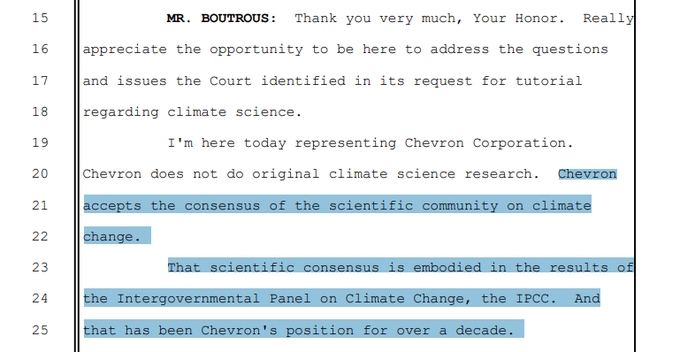|
The age of climate denial is dead. Not everybody knows it yet, but, at this point in time, the days of climate denial are clearly numbered. Of this, there is no doubt.
I say this because no matter what silly things you might read from the mysterious, self-proclaimed experts on Twitter, the very companies that stand to profit the most from climate denial have now openly conceded that burning fossil fuels contributes to anthropogenic climate change. Once they were taken to court for their wanton destruction of our planet's biosphere, the world's largest and wealthiest oil companies were forced to make these concessions. Essentially, as soon as they had to come before a judge, the jig was up. All Lies are not the Same You see, it's one thing to lie and misdirect the public through privately funded intermediaries, but doing these same things in court is a whole other ballgame, In 2018, when brought to court to examine "the best available knowledge that we have today on the issue of carbon dioxide in the atmosphere and how that affects global temperature" (P. 80, LL. 20-22. State of California vs. BP, Chevron, Conocophillips, Exxon Mobil, & Royal Dutch Shell, US District Court, Northern District Of California, March 21, 2018), lawyers for the oil companies immediately conceded that the findings of the Intergovernmental Panel on Climate Change are indeed correct. Moreover, they wasted no time on climate denial or alternative theories regarding global warming, and they took absolutely no issue with the fact that burning fossil fuels contributes to anthropogenic global warming. On March 21, 2018, in his submissions to the US District Court, Northern District Of California, Theodore Boutrous, the attorney for Chevron Corporation, stated, "Chevron accepts the consensus of the scientific community on climate change. The scientific consensus is embodied in the results of the Intergovernmental Panel on Climate Change, the IPCC." Boutrous was even bold enough to say, "And that has been Chevron's position for over a decade." (P. 80, LL. 20-22, 2018).
This public concession telegraphed a significant and marked departure from the silent, "no comment" position that oil companies have historically taken on the connection between fossil fuels and climate change. Moreover, it effectively pulled the carpet out from under the climate denial lobby. After all, if the oil industry itself is now officially accepting anthropogenic climate change, then the freshly disavowed climate denial lobby immediately becomes relegated to the status of disenfranchised crackpots.
Traditionally, oil companies relied heavily on a healthy and mutually beneficial relationship between themselves and third-party climate deniers, including trade associations and think tanks, to confuse and misdirect the public about the impact that fossil fuels were having on the planet. In fact, some studies have suggested that oil companies spend $200,000,000.00 on climate denial efforts every year. In 2013, Robert Brulle, a professor of sociology and environmental science at Drexel University, published the first peer-reviewed study of who was actually funding what he called the "climate change counter-movement" (CCCM) that had so effectively delayed action on the climate crisis. Brulle found that between the years of 2003 and 2010, more than $500,000,000.00 had been donated by "private conservative philanthropic foundations to organizations whose output included material disputing the consensus" (Brulle, 2013). Brulle concluded that "Thinktanks, trade associations and front groups" were a key part of the effort, with their major funders being foundations affiliated to the fossil fuel magnates, such as the Koch brothers, ExxonMobil, and the ultra-conservative Scaife and Bradley foundations. A few years before the Brulle study was published, Naomi Oreskes and Erik Conway explored the history of climate denial in their 2010 book, The Merchants of Doubt. Oreskes and Conway argue that "keeping the controversy alive" by spreading doubt and confusion about the scientific consensus on climate change was the basic strategy of those opposing climate action. In 2014, their book was made into a film, Merchants of Doubt, directed by Robert Kenner. Today, oil companies are hastily pivoting from their traditional position of climate denial to one of climate acceptance - at times even attempting to present themselves as climate champions. As opposed to suppressing their scientific studies, they now acknowledge - even take pride in - the science that they have conducted for decades. Today, Exxon Mobil's web site includes a page entitled "Climate Change," with a tagline that states, "We believe that climate change risks warrant action and it’s going to take all of us — business, governments and consumers — to make meaningful progress." The page goes on to say, "ExxonMobil scientists have been involved in the forefront of climate research for four decades, understanding and working with the world’s leading experts on climate." It is as if they are now saying, "Of course we know about climate change... we're the ones who discovered it!" How the Courts Are Responding Neither the science, nor the brazen measures that oil companies have undertaken to confuse the public on the issue of climate change, have been overlooked by the courts. On July 22nd, 2019, Republican-appointed Judge William Smith of the U.S. District Court for the District of Rhode Island ruled that the state of Rhode Island would be permitted to pursue their public nuisance case against 21 different oil companies in state court. In this case, the State of Rhode Island is pursuing compensation from these oil companies damages for the damage that their products have had, and will continue to have, on the state by way of climate change. After hearing the evidence brought forward, Judge Smith sharply derided oil companies for their wilful destruction of the planet: “…Defendants in this case, who together have extracted, advertised, and sold a substantial percentage of the fossil fuels burned globally since the 1960s. This activity has released an immense amount of greenhouse gas into the Earth’s atmosphere, changing its climate and leading to all kinds of displacement, death (extinctions, even), and destruction. What is more, Defendants understood the consequences of their activity decades ago, when transitioning from fossil fuels to renewable sources of energy would have saved a world of trouble. But instead of sounding the alarm, Defendants went out of their way to becloud the emerging scientific consensus and further delay changes – however existentially necessary – that would in any way interfere with their multi-billion-dollar profits. All while quietly readying their capital for the coming fallout.”
At this point in time, the prospects for big oil are not particularly good. It would be an understatement to say that neither the oil industry nor their shareholders are happy about the potential of paying out billions of dollars in damages to states, countries, or jurisdictions now suffering the effects of climate change. However, the bad news gets even worse for the oil industry.
There are those who now say that civil lawsuits do not go far enough: that, to big oil, civil payouts could just be seen as a new cost of doing business. Jojo Mehta, is currently calling on the International Criminal Court to include ecocide as a crime against humanity. Mehta suggests that, "In a weird kind of way, suing is almost a way to legitimize this. You're saying you can do this, but you have to pay for it. Actually, what we want is for them to stop, and for that to be done requires a crime."
Facing a growing number of civil suits around the world, and more recently facing the daunting prospect of becoming criminally liable for their actions, oil companies are scrambling to reinvent themselves in the post-denial era. As the decades-old, oil-funded web of deceit quickly unravels, we are witnessing companies such as Shell distancing themselves from the climate-denying oil lobby groups they previously funded, and proactively reframing their position on climate change. Shell is even producing its own Podcast, entitled The Energy Podcast, wherein the company comes clean about the role that fossil fuels play in climate change.
However, it should be noted that there is a subtle but critical difference between accepting the role that fossil fuels play in climate change, and accepting responsibility for the climate change caused by fossil fuels. The distinction requires a certain amount of skillful mental acrobatics... but Shell does an admirable job of it. According to Big Oil, We are All to Blame Essentially, Shell now takes the position that we are all responsible for climate change. In this regard, Shell and Exxon Mobil are united in their positions. Episode #5 of Shell's Podcast features an interview with Maarten Wetselaar, the Integrated Gas & New Energies Director at Shell. Wetselaar responds brilliantly to a question asking him if Shell is responsible for climate change. He responds by saying, "Society as a whole has built itself around hydrocarbons, and much of our prosperity and current health and wealth comes from it, so that problem is a problem that we share with all our consumers and regulators and governments." Wetselaar also makes no bones about his view that climate action has to start with the consumer. When asked, "Why don't you just stop producing oil altogether?" Wetselaar states, "From a system perspective... the answer is not in producing less oil and gas. The answer is in consuming less oil and gas. If I produce no oil tomorrow, someone else will. If I consume less oil tomorrow, the production can go down accordingly." (Emphasis added.) So there you have it. Big oil no longer denies climate change, nor will they openly, and I stress "openly," attempt to obfuscate the role that hydrocarbons play in anthropogenic global warming. On that issue, they now side with the scientific consensus. Big oil does, however, stop short of accepting responsibility for the climate change caused by their products. That dubious honour, as it would turn out, they place squarely on you and me. In a manner of speaking, I suppose they are right. With the age of climate denial clearly coming to an end, we consumers of energy can no longer feign a position of ignorance or wilful blindness. It is now incumbent on us all - each and every one of us - to take immediate, bold, and decisive steps to confront the existential crisis that lies before us. While the momentum is certainly going in the right direction, we cannot wait for governments, courts, or corporations to do the right thing. We know what the right thing to do is... and we must do it.
0 Comments
Dear climate denial lobby, Let's be friends. I need some quick cash because I'm looking to buy another Tesla... maybe that sweet new Model Y! So look, I was wondering if the climate denial lobby would fund me... say around $100,000.00 (that's nothing to you guys, right?) to write a paper showing that, out of the roughly 50 million research papers written on any topic since the beginning of time, only 3,896 research papers, exploring the cause of climate change, published between 1991 and 2011, actually support anthropogenic climate change. Then you could tell everybody that only 0.008% of research supports anthropogenic climate change! Get it!? And the beauty is... you wouldn't even be lying! I mean, come on, that's gold! Am I right? Call me. We'll talk. Sincerely, Art Lightstone www.green-neighbour.com @GreenNeighbour PS. I realize there is nothing particularly new in my proposed approach to climate denial: after all, this is the basic tactic you've been utilizing on a daily basis for decades in attempt to create a false sense of doubt on the issue of anthropogenic climate change. However, I think the true genius to my proposal is in its bold, take-no-prisoners, approach. I mean, if you're going to skew research results, then skew those results good! |
Green NeighbourWhen it comes to the environment, we are all neighbours. Archives
November 2022
Categories
All
|


 RSS Feed
RSS Feed